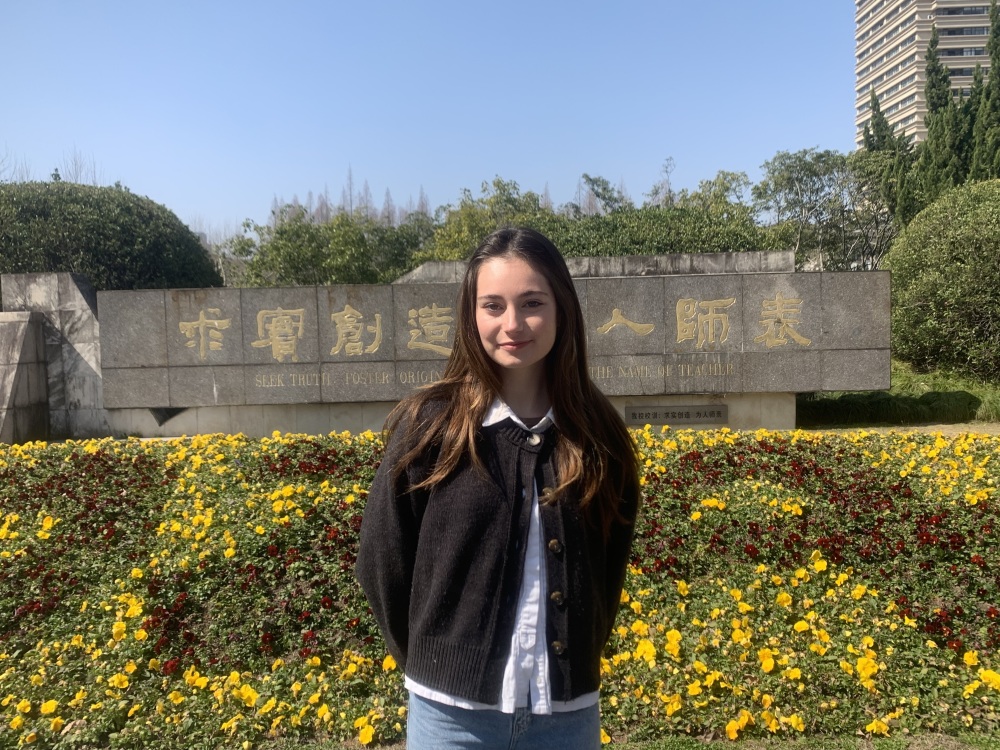When we see this youthful face on the screen, the first thing we say to ourselves is that Clara Corcuff has no shortage of guts. We immediately think of that day in September 2023 when a young girl, barely 20 years old, landed at the Shanghai airport alone with a suitcase, the first phase of a one-year study in the largest city of the most populous country in the world. “In the first days, it is true that there is something stressful,” he confides, “you have the impression that you have put your life on hold and started a new one, opening a bank account… All this while still having a limited knowledge of the language.”
However, the Chinese language and civilization are not a revelation for Clara.
“At first I wasn't that interested in Asian culture”
In 2018, when she entered Giocante-de-Casabianca High School in Bastia – after studying at Sisco Primary School and Luri High School – the young girl chose the Chinese option. “In the beginning, I wasn't that interested in Asian culture; my parents saw it as more of a challenge,” she confides in my final year Desire for Parcours sup, that I had a discussion with a former high school student, in Paris, at the Institute of Oriental Languages and joined the Chinese language, literature and civilization at University of Bordeaux.”
“I wanted to discover China in real life”
Two years of study later, after a decisive encounter (another one) with a Chinese student, Clara decides to preempt the usual path. She took advantage of the partnership between Montaigne University and East China University to complete her third year of study in Shanghai.
A choice that is all the more daring because it requires him to attend the French and Chinese curriculum at the same time. “I wanted to go, challenge myself,” she confides, “I wanted to discover China in real life.”
Six months later, acclimatization seems to have succeeded. First of all on the linguistic level. “When you're completely immersed, it's much easier to progress,” explains the student. “In college you mostly acquire an academic knowledge of Chinese culture, a level of language that allows me to follow everyday conversations, to carry out the formalities of everyday life, to understand people talking to each other on the subway…”
“There are young people from all over the world”
On a human level, the experience is just as compelling. After renting an apartment, Clara now shares a college room with a Russian roommate (and friend). “Foreign students attend classes in a building reserved for them,” she explains. “There are young people from all over the world: Koreans, Japanese, Russians, Kazakhs, Germans, Italians too… It's a very cosmopolitan environment.”
Separated from their Chinese colleagues in the university classrooms, these students from all over the world experience a society that maintains an ambivalent attitude towards foreigners: “It is not easy to establish relations with the Chinese. They are very good to us, but they tend to keep to themselves. At the same time, we feel to admire Westerners who, in their eyes, represent romance.
“The university is a real city, crossed by two rivers…”
Human experience, however, retains all its value. In Shanghai, a megacity of 27 million inhabitants, Clara Corcuff discovers a gigantism unmatched in the world she comes from. “Everything is oversized,” she explains. “The university is a real city, intersected by two rivers, with a supermarket and residential buildings for staff. Shanghai is a giant city. Strictly speaking, there is no city center. It is designed as a junction of several centers, we see waves of people coming through streets that have nowhere to go in our country from the city and really find nature.”
“I believe that the Chinese people do not see themselves as oppressed”
Surprised, the young islander is also surprised by the political, social and security climate in which she lives. A very different climate, in terms of its feelings, than the one described by the Western media when dealing with China. “We should move away from stereotypes, she believes. At home, we tend to talk a lot about China negatively. This is a mistake we have. On a daily basis, I have never felt the oppression of the Communist Party or Xi Jinping's policies. The truth is that this society is very different from ours, even in classrooms and in taxis, but when we talk to people, no one has ever whispered criticism to me, I believe that the Chinese people do not see themselves as oppressed.”
“Clara is a very independent young girl who never gives up”
Clara, whatever happens, feels good in China. Even if he sometimes feels homesick, he intends to prolong the experience.
At the end of this academic year, he plans to continue his studies in Shanghai. “I had a period of questioning what I wanted to do and what mastering the Chinese language could bring me,” she confides, “My first choice would be to complete a master's degree in commerce.” , marketing and international business. “
A master's degree for which the young girl applied to the local university authorities. In her file, she put a letter of recommendation from Xin Devichi, the teacher who introduced her to Chinese at Giocante High School. “Clara is a very autonomous young girl who never gives up, emphasizes the professor. At the same time, she has a lot of gentleness and humility. Contrary to popular opinion, this is a profile I often meet among high school girls whom I teach Chinese in Bastia.”
A reply from East University of China should arrive in less than a month. But whatever the answer, the girl plans to return home for the summer. Just to enjoy her family and the sea, which she admits she misses a lot.
